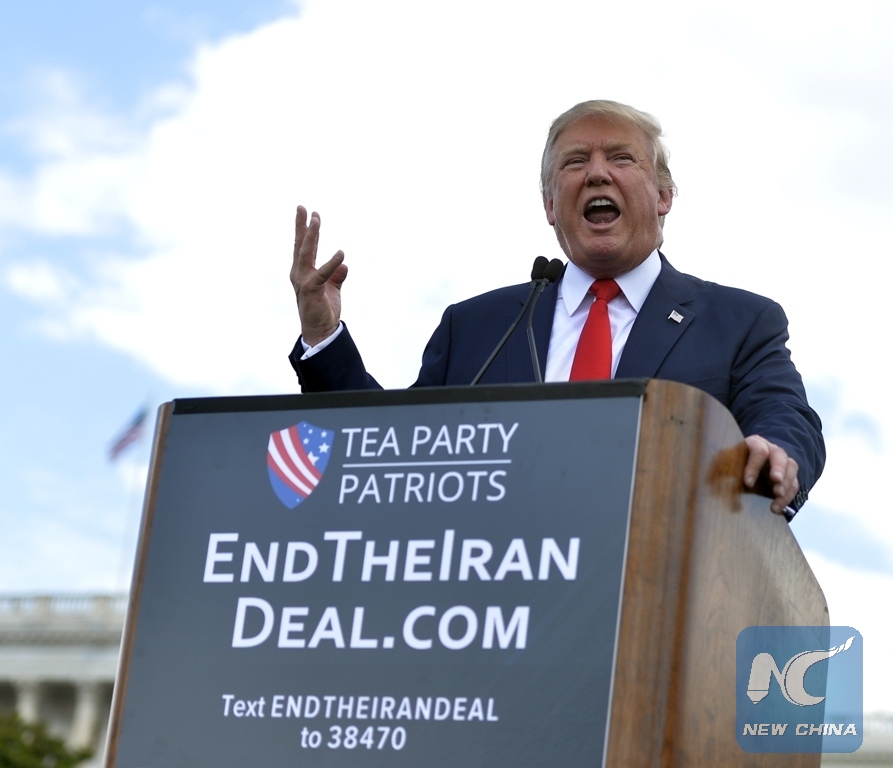
File Photo: U.S. Ambassador to the United Nations John Bolton (C) talks with other participants during the United Nations General Assembly, at UN headquarters in New York, on Oct. 16, 2006. (Xinhua Photo/Zhao Peng)
WASHINGTON, March 22 (Xinhua) -- U.S. President Donald Trump announced Thursday that hawkish former diplomat John Bolton would replace three-star general H.R. McMaster as the National Security Adviser.
Bolton, born in 1948, graduated from Yale Law School in 1974 with an J.D. degree, was drafted to the military during the final phase of the Vietnam war, but he dodged service by enlisting himself in the Maryland Army National Guard.
He later confessed that he "had no desire to die in a Southeast Asian rice paddy," as he considered "the war in Vietnam already lost."
After graduating from Yale, Bolton practiced law in Washington D.C. Through the 1980s and 1990s he zig-zagged between public service and the private sector, becoming U.S. States Assistant Attorney General for the Civil Division under former President Ronald Reagan between 1988-1989.
Bolton had his first encounter with the State Department in 1989, when he became the Assistant Secretary of State for International Organization Affairs.
In 2001, under the former president George W. Bush, Bolton assumed his first major diplomatic role as the Under Secretary of State for Arms Control and International Security Affairs, which focused on the prevention of proliferation of weapons of mass destruction. But in his capacity, Bolton has worked against international arms control efforts, citing U.S. national security as a higher priority.
In 2005, Bush sought to promote Bolton as the U.S. Ambassador to the United Nations, but faced ferocious opposition from both the Democratic and Republican Parties.
Due to his lack of support, Bolton's nomination never cleared in the Senate, and was appointed later to the post while Congress was in recess.
As he never gained enough support in Congress, Bolton gave up pursuing a second term in 2006.
Bolton returned to the private sector after his resignation, taking on various posts with conservative think tanks, law firms and advocacy groups. His curriculum vitae (CV) includes experience with the American Enterprise Institute and the National Rifle Association. He has also been a regular commentator on conservative TV station Fox.

File Photo: U.S. Republican presidential candidate Donald Trump speaks during "Stop the Iran Deal" rally at West Lawn of the Capitol in Washington D.C., capital of the United States, Sept. 9, 2015. (Xinhua/Bao Dandan)
During his tenure in the State Department and post-state department roles, Bolton has been an outspoken critic of the Iranian nuclear deal and of the United Nations, and a staunch supporter of the Iraq War, which drew him fierce criticism.

Ann Adams kneels in front of the grave of her son U.S. Army Andrew Baddick in Section 60 on Memorial Day at Arlington National Cemetery on May 28, 2012 in Virginia. Section 60 is reserved for veterans of the Iraq War and Afghanistan war. (Xinhua/Zhang Jun)
"There is no United Nations. There is an international community that occasionally can be led by the only real power left in the world, and that's the United States, when it suits our interests and when we can get others to go along," Bolton said once of the United Nations.
His pro-war position has heightened concern among many that the United States may develop an even more aggressive foreign policy, further alienating itself with its allies in Europe and Asia.

